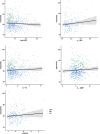Impulsivity across severe mental disorders: a cross-sectional study of immune markers and psychopharmacotherapy
- PMID: 37674162
- PMCID: PMC10483855
- DOI: 10.1186/s12888-023-05154-4
Impulsivity across severe mental disorders: a cross-sectional study of immune markers and psychopharmacotherapy
Abstract
Background: Impulsivity is a transdiagnostic feature linked to severe clinical expression and a potential target for psychopharmacological strategies. Biological underpinnings are largely unknown, but involvement of immune dysregulation has been indicated, and the effects of psychopharmacological agents vary. We investigated if impulsivity was associated with circulating immune marker levels and with a range of psychopharmacological treatment regimens in severe mental disorders.
Methods: Impulsivity was assessed in a sample (N = 657) of patients with schizophrenia or schizophreniform disorder (SCZ) (N = 116) or bipolar disorder (BD) (N = 159) and healthy participants (N = 382) using the Barratt Impulsiveness Scale (BIS-11) questionnaire. Plasma levels of systemic immune markers (RANTES, IL-1RA, IL-18, IL-18BP, sTNFR-1) were measured by enzyme immunoassays. Patients underwent thorough clinical assessment, including evaluation of psychotropic medication. Associations were assessed using linear regressions.
Results: Impulsivity was positively associated with SCZ (p < 0.001) and BD (p < 0.001) diagnosis and negatively associated with age (p < 0.05), but not significantly associated with any of the circulating immune markers independently of diagnostic status. Among patients, impulsivity was negatively associated with lithium treatment (p = 0.003) and positively associated with antidepressant treatment (p = 0.011) after controlling for diagnosis, psychotropic co-medications, manic symptoms, and depressive symptoms.
Conclusions: We report elevated impulsivity across SCZ and BD but no associations to systemic immune dysregulation based on the current immune marker selection. The present study reveals associations between impulsivity in severe mental disorders and treatment with lithium and antidepressants, with opposite directions. Future studies are warranted to determine the causal directionality of the observed associations with psychopharmacotherapy.
Keywords: Antidepressants; Bipolar disorder; Chemokine CCL5; Cytokines; Impulsiveness; Interleukin-1; Lithium; Psychopharmacology; Schizophrenia; Tumor necrosis factor.
© 2023. BioMed Central Ltd., part of Springer Nature.
Conflict of interest statement
OAA is a consultant for HealthLytix and received speaker's honorarium from Lundbeck and Sunovion. All the other authors declare that they have no competing interests.
Figures


References
-
- McCutcheon RA, Reis Marques T, Howes OD. Schizophrenia-an overview. JAMA Psychiat. 2020;77(2):201–210. - PubMed
-
- Vieta E, Berk M, Schulze TG, Carvalho AF, Suppes T, Calabrese JR, et al. Bipolar disorders. Nat Rev Dis Primers. 2018;4:18008. - PubMed
-
- Stanford MS, Mathias CW, Dougherty DM, Lake SL, Anderson NE, Patton JH. Fifty years of the Barratt impulsiveness scale: an update and review. Person Individ Differ. 2009;47(5):385–395.
-
- Nanda P, Tandon N, Mathew IT, Padmanabhan JL, Clementz BA, Pearlson GD, et al. Impulsivity across the psychosis spectrum: Correlates of cortical volume, suicidal history, and social and global function. Schizophr Res. 2016;170(1):80–86. - PubMed
Publication types
MeSH terms
Substances
LinkOut - more resources
Full Text Sources
Medical
Miscellaneous

